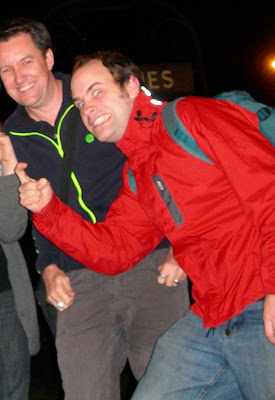by neil
 I can’t believe that my friend Paul Hendrich is dead, but he is. He was apparently cycling from his home in Battersea to Goldsmiths in New Cross when he was hit by a lorry on Wednesday. He was just 36 years old, and leaves behind his wife Sasha and their one-year old daughter, Agatha.
I can’t believe that my friend Paul Hendrich is dead, but he is. He was apparently cycling from his home in Battersea to Goldsmiths in New Cross when he was hit by a lorry on Wednesday. He was just 36 years old, and leaves behind his wife Sasha and their one-year old daughter, Agatha.
I first met Paul a couple of years ago when he got in touch to interview me for a project he was doing about the former Deptford Town Hall, taken over by Goldsmiths College in 1998. Like me he had drawn the connections between its maritime statues and Deptford’s links with slavery and colonialism. Unlike me he decided to do something about it, not only making it the focus of his Masters dissertation – the basis of an article to be published in the April issue of Anthropology Matters – but launching a campaign for Goldsmiths to publicly acknowledge this history in the context of debates about marking the abolition of slavery and the appropriateness of apologies and reparations. He was instrumental in organising an event at the Town Hall in June 2007 on ‘Repairing the Trauma of History: What does an apology of substance look like?’ which featured a group of people on the Sankofa Reconciliation Walk wearing yokes and chains attempting to make reparation for the acts of the seamen carved in stone on the front of the building.
Paul also organised a Town Hall Pirate society at Goldsmiths to have fun playing around with piracy while raising serious questions about an alternative maritime narrative from below. The photo of Paul here doing his Captain Hook pose was taken on a visit by the Pirates to the Island, where I met them to talk about the history and wonders of this New X traffic island.
In September 2007 he was involved in organising the Migrating University/No Borders events at Goldsmiths. We then worked closely together on the Lewisham ’77 events, including a walk and a conference to mark the 30th anniversary of the anti-fascist demonstrations in New Cross and Lewisham. Paul’s active opposition to racism carried over into his job, where he worked with young refugees. At the time of his death, he was preparing to sail to Arizona, USA to research the various forms of activism that have taken shape around undocumented cross-border migration of Mexicans into the US.
Sophie Day from Goldsmiths Anthropology department is right to say that ‘Paul’s enthusiasm, generosity, kindness and inclusiveness drew everyone he met into the broader issues that he was thinking about and working on’. He made many things happen, and everyone who knew him will also be mourning all the other numerous things he never got to make happen – he was always bubbling over with ideas. We never did find time to have those conversations about Brighton raves back in the day, the Yeovil music scene or contemporary americana (I believe Paul was learning to play the banjo) – we were always too busy planning and scheming.
